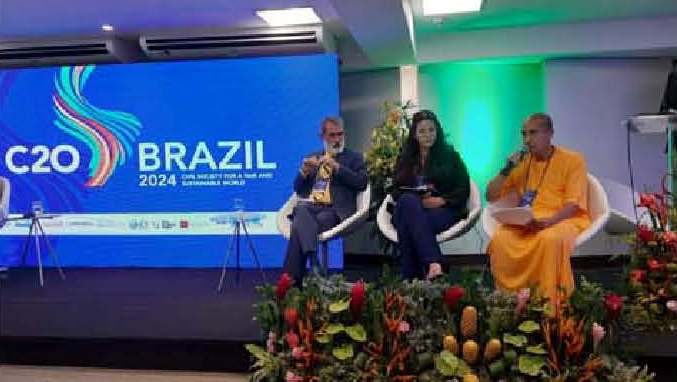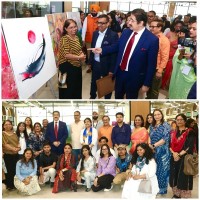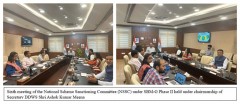- International SOS and Healthcare Consultants International announces partnership to improve patient services
- The Techpro India Launches Comprehensive RO Water Purifier Systems Service in Kolkata
- JIS Spring 2025 Concludes with Strong Attendance, Trend-Driven Sourcing and Valuable Connections
- The Leela Hyderabad Appoints Rajesh Gopalakrishnan as General Manager
- Vedaanta Senior Living Achieves Remarkable Growth with 55% Revenue Surge in FY 2024-25
- PrivateJetCharter.pro Launches Industry-Leading Flight Time, Distance, and Cost Calculator for Aviation
- Kopyst Claims to Reduce Onboarding Time by 80% with AI-Powered Step-by-Step Guides
- Industry Leaders of B2B & Precision Manufacturing, Space Tech, and Defence Boost India’s Global Edge at Startup Mahakumbh 2025
- Motorola launches edge 60 FUSION with the World’s Most Immersive 1.5K All 4 sides Curved Display
- Civita App Introduces QR Code Scanning for Local Plants and Better City Services
- New GAC EMPOW sedan have started in GAC AVTODOM dealerships
- First Coffee Expands To 10 Outlets, Brewing A New Era For Coffee Lovers In India
- Busch Group Presents Solutions for the Semiconductor Industry at SEMICON SEA 2025
- Vietjet Expands Global Reach with Four New Vietnam-China Routes
- Freudenberg Group reports strong 2024 performance, strengthening its commitment to sustainable growth in India
 Mail to a Friend Mail to a Friend |
|
     |
Gauranga Das Prabhu represents India at G20 C20, Brazil

C20, a vital part of the G20 process, aims to foster global collaboration among civil societies to address various challenges.This year, under Brazil's G20 Presidency, C20 established WG 2: Food Systems,Hunger, and Poverty. Govardhan EcoVillage was honoured to be chosen by the Brazilian Association of NGOs as a co-facilitator for this working group along with Assau, Brazil.
With the purpose of bringing together voices, ideas, and solutions from civil societies across the globe,C20 Brazil 2024 was initiated to address hunger, poverty, and food system security issues. The pressing need for global unity of inclusive, anti-racist, and democratic economies to eliminate inequalities within and between countries was also highlighted during this inception meeting. As India's representative, HG Gauranga Das, Director of Govardhan EcoVillage, had the privilege of participating in this event held in Recife, Pernambuco.
During the event, Gauranga Das highlighted India's rich cultural heritage and the principle of oneness as a solution to global challenges. Reflecting on the past efforts during India's 2023 Presidency, he said, "Govardhan EcoVillage successfully promoted constructive dialogues on 'Food and LiFE (Lifestyle for Environment)' through various forums. As co-facilitators this year, our goal is to facilitate meaningful discussions, consolidate policy documents, and devise effective advocacy strategies. Our commitment extends beyond the event as we continue to drive discussions on food system security within G20countries."
At Recife, Gauranga Das and Mariana from Assau, Brazil, led the Working Group 2 and spoke about perspectives and processes, respectively. Gauranga Das said, "We are looking at improving civilization. The primary condition of civilization is the availability of an abundance of food,and the primary discipline of civilization is the sharing of that food, especially in the Vedic wisdom, as described in our G20 slogan for India last year- Vasudeva Kutumbakam - The whole world is considered as afamily."
He further added, "There are three important principles described from Taittirya Upanishad - Annam nanindayat tad vratam, which means one must not condemn food, Annam na parichakshita tad vratam, one must not neglect food and Annam Bahu Kurvita, one must grow food in abundance, and one must give food freely. Therefore, first of all, life is sustained by food, and then the world benefits from this food and the grower and giver of food is the best well-wisher and life-giver."
Further, addressing the need to promote equity and eliminate inequalities Gauranga Das said, "The rich diversity and deep-rooted cultural ethos of Bharat (India) believe in oneness,where all existence emanates from a divine principle. It underscores the role of rituals and familial transmission in instilling these values. Collaboration, solidarity, and a commitment to systemic change are essential in building a better future for all.The present education system is proposed to go beyond cognitive learning, integrating socio-cultural, emotional, ethical, and spiritual dimensions to promote a connection with nature and respect for diversity. To ensure sustainability, a value-based framework is the need of the hour, which emphasizes decentralization, local empowerment, reverence for nature,and collective responsibility alongside the Sustainable Development Goals (SDGs). Addressing resource access requires ethical governance and regenerative practices, with civil society organizations (CSOs) playing a crucial role in raising awareness and implementing adaptive resource management at grassroots levels."
Here are a few key discussions, statistics, policy recommendations, case studies, challenges, and future directions outlined during the event by Gauranga Das during his address:
Global Inequality Statistics:
Global inequality statistics reveal alarming disparities in income, wealth, and resource access worldwide.The top 10% of the global population earns 52% of the income, while the bottom half earns only 8%. Wealth distribution is even more skewed, with the richest 10% owning 76% of all wealth, leaving the poorest half with just 2%. Within countries, income gaps have nearly doubled between the top 10% and bottom 50% over two decades. These statistics underscore the urgent need for systemic change to address inequality.
Root Causes of Inequality:
Colonialism, imperialism, discrimination, and unequal resource distribution have been identified as the root causes of inequality. These historical factors continue to shape economic disparities today, highlighting the necessity for addressing systemic injustices.
Anti-Racist Policies and Practices:
Affirmative action initiatives, such as India’s MGNREGA guaranteeing paid work to rural households,Brazil’s social inclusion policies, and the United States federal programs for higher education diversity,promote equal opportunities for marginalized groups.
Democratic Economic Models:
Kerala’s decentralized planning experience demonstrates the benefits of empowering local communities, leading to improved education, healthcare, sanitation, and women’s empowerment. This highlights the transformative potential of democratic economic models in reducing inequality and empowering marginalized communities.
Role of Education and Awareness:
Education and awareness play a pivotal role in challenging biases, fostering empathy, and promoting solidarity across diverse groups. In schools, anti-bias education, inclusive curricula, and critical reflection nurture empathy and combat prejudice among students.
Intersectionality:
Taking multiple identities into consideration, diverse representation in decision-making,promoting equitable access to resources, disaggregated data collection, stakeholder education on intersectionality and challenging that perpetuate inequality is possible through policy reforms. We strive for a more just and inclusive society by addressing intersectional inequalities, dismantling systemic injustices and promoting equity.
Policy Recommendations:
Gauranga Das proposes various policy recommendations to combat inequality, including implementing a Universal Basic Income (UBI), investing in social safety nets and public services, promoting international cooperation, and addressing tax havens. These measures aim to promote inclusivity, reduce poverty, and foster economic stability.
Case Studies and Success Stories:
Case studies such as Kerala’s decentralized planning experience and UNESCO’s World Inequality Report2022highlightsuccessfulinitiativesinreducinginequalityand promoting inclusivity. These success stories underscore the importance of holistic approaches and global collaboration in addressing the root causes of exclusion.
Challenges and Future Directions:
Gauranga Das also addressed challenges during the event, such as opposition to economic reforms,divisive political climates, and historical legacies of colonialism and discrimination. Future directions include adopting intersectional approaches, involving affected communities in policy design, promoting an understanding of intersectionality and economic justice, and strengthening anti-discrimination laws.
Company :-The Other Circle
User :- Shivani Sharma
Email :-shivani@theothercircle.com
Mobile:- 7045119322











